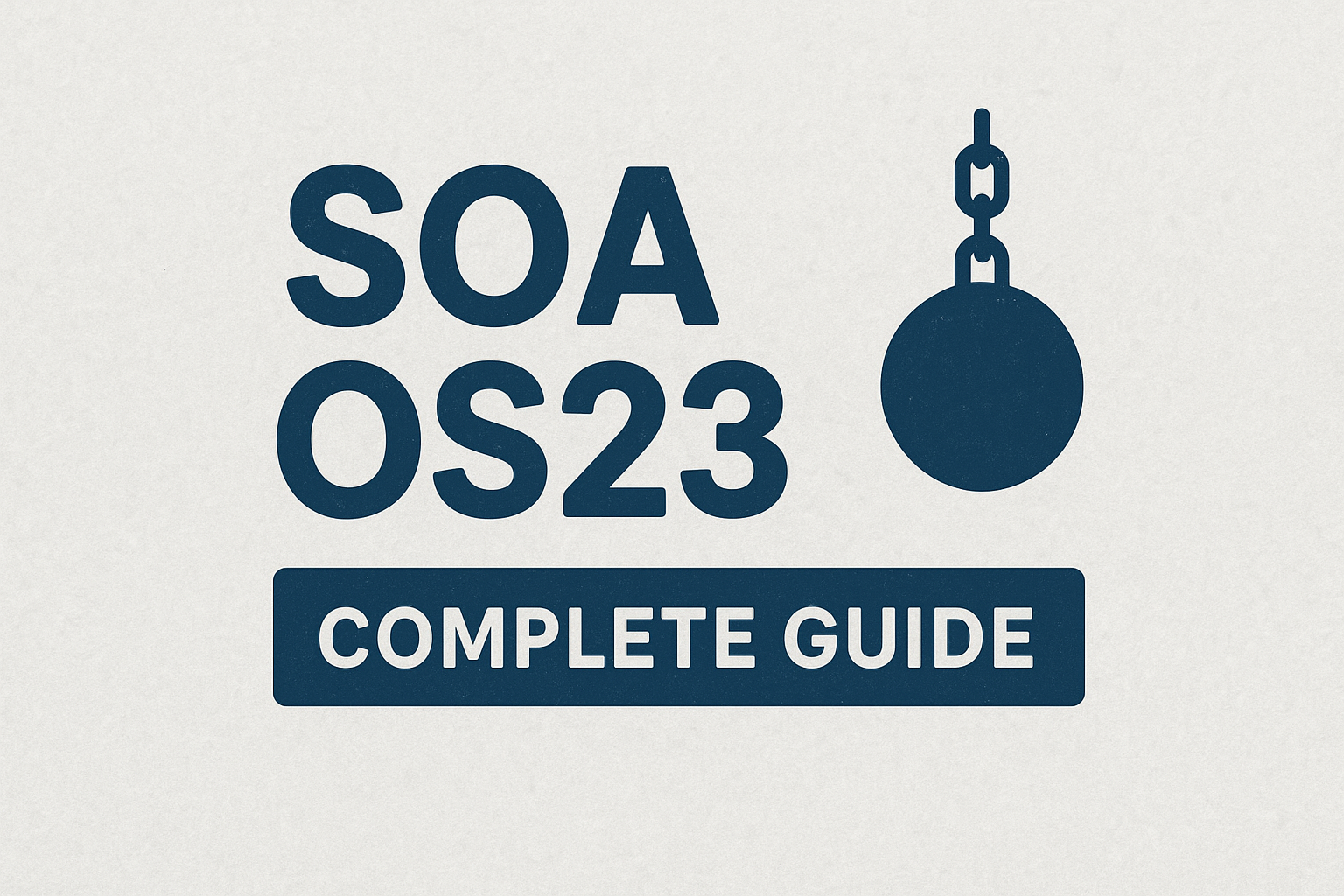SOA OS23: Complete Guide to the Italian Demolition Certification
When people search for soa os23, they are usually looking for clear, trustworthy information about what it actually means, why it’s important in the construction sector, and how companies can obtain it. Unfortunately, most content online only scratches the surface or mixes unrelated information.
In this article, you’ll find a complete, experience-based guide to SOA OS23 — Italy’s certification for demolition works under the national public procurement system. Drawing on real experiences of contractors and experts in construction compliance, this guide explains the definition, purpose, process, challenges, and benefits of obtaining the SOA OS23 category, in simple and accurate language.
Understanding SOA Certification
What Is SOA Certification?
SOA stands for Società Organismo di Attestazione, a certification required for companies that wish to participate in public works in Italy valued above €150,000. It serves as proof that a company has the technical, financial, and organizational capability to carry out construction projects safely and effectively.
SOA certification is divided into categories (OG and OS), which represent different areas of specialization. Each company must obtain certification in the specific categories that reflect the work it performs.
The Role of OS Categories
The OS categories (Opere Specializzate) focus on specialized work, such as structural steelwork, plumbing, electrical systems, or demolition. To be eligible for public tenders in these areas, contractors must demonstrate experience, financial solidity, and compliance with safety and environmental standards.
What Is SOA OS23?
The SOA OS23 category specifically covers demolition works. This includes all activities related to the dismantling or demolition of buildings, structures, or industrial plants, including the separation, recovery, and disposal of resulting materials.
According to Italy’s construction classification framework, OS23 falls under specialized works (Opere Specializzate) and is essential for any company that intends to:
- Carry out demolition or controlled dismantling of reinforced concrete structures
- Manage large-scale demolition in urban or industrial environments
- Participate in public tenders involving demolition or removal of obsolete infrastructure
This certification not only authorizes a company to bid on public demolition projects but also demonstrates that it operates under strict technical and legal standards.
Why SOA OS23 Matters
In practice, SOA OS23 is much more than a bureaucratic label. It is a benchmark of competence and reliability. Here’s why it matters:
- Legal Requirement: Without OS23 certification, a company cannot legally participate in public demolition projects in Italy.
- Professional Credibility: It signals that your organization meets rigorous safety, environmental, and technical requirements.
- Tender Competitiveness: Many public tenders specify OS23 as a minimum qualification criterion.
- Risk Reduction: Certification ensures that your internal processes, safety protocols, and technical operations comply with national regulations.
From my experience working with certified contractors, having OS23 can also help when dealing with private clients who prefer verified partners for complex demolition jobs.
Requirements to Obtain SOA OS23 Certification
Earning OS23 involves a detailed evaluation process managed by an authorized certifying body. The assessment focuses on five main areas:
1. Technical Capacity
You must demonstrate experience in demolition projects over the previous ten years. Evidence typically includes:
- Signed contracts and invoices
- Project completion certificates
- Safety and environmental documentation
- Proof of correct waste management and material separation
2. Financial Capacity
The certifying body checks the company’s balance sheets, liquidity ratios, and overall financial health. Sufficient capital and stability are required to ensure the company can handle large-scale demolition work without financial risk.
3. Organizational Capacity
This includes the structure of your business, qualified staff, safety management systems, and equipment inventory. You must show that your company has both skilled personnel and the technical resources necessary for demolition.
4. Contract Performance (“Contratto di Punta”)
To qualify for a specific class of certification, you need to prove that you have successfully completed at least one major contract of a certain value, usually 40% of the target class. Alternatively, multiple smaller contracts can be combined (two at 55% or three at 65%).
5. Compliance and Documentation
Authorities verify that your company is legally compliant, insured, and in good standing. This includes:
- Valid registration with the Chamber of Commerce
- Tax and insurance compliance
- Safety certifications (e.g., workplace safety, waste disposal authorization)
- Environmental management compliance
Classes of OS23 Certification
SOA categories are divided into different classes, depending on the value of works your company is qualified to handle.
| Class | Maximum Value of Works (€) | Description |
| I | Up to 258,000 | Small demolition projects |
| II | Up to 516,000 | Medium-scale demolition |
| III | Up to 1,033,000 | Larger urban demolition |
| IV | Up to 2,582,000 | Major industrial or structural demolitions |
| V | Up to 5,165,000 | Large-scale or multi-site operations |
| VI | Up to 10,329,000 | National-level demolition projects |
| VII | Up to 15,494,000 | High-complexity public projects |
| VIII | Unlimited | Full authorization for any project size |
Choosing the correct class depends on your company’s historical contracts, equipment, and financial capabilities.
The Certification Process: Step-by-Step
- Preliminary Audit: Assess your company’s readiness and identify documentation gaps.
- Document Preparation: Gather technical and financial records, contracts, and certifications.
- Submission to SOA Body: Present the documentation to an accredited SOA certifier.
- Evaluation: The certifier reviews your materials, conducts interviews, and may request clarifications.
- Approval and Issuance: Once verified, your OS23 certification is issued and registered publicly.
- Renewal: Certification must be maintained and periodically renewed to stay valid.
This process typically takes a few months, depending on the completeness of your documents and responsiveness during verification.
Common Challenges During the OS23 Process
- Incomplete Documentation – Many companies fail to keep full project records. Keep detailed files for every contract, including safety and waste disposal documents.
- Financial Weakness – Ensure your financial ratios meet minimum standards before applying.
- Insufficient Work History – If you are new to demolition, consider subcontracting or forming partnerships to build qualifying experience.
- Delays in Certification – Bureaucratic review can take longer than expected; start the process early.
- Lapsed Renewals – Certification expires after a fixed period. Monitor renewal deadlines to avoid suspension.
Real-World Application Example
A mid-sized Italian contractor, EdilDemolizioni Srl, decided to expand into public tenders for demolition. Initially, they lacked SOA OS23 and had to partner with another certified company. Over three years, they completed several medium-scale demolitions, documented every step, and invested in equipment.
When they finally applied for OS23, their strong project history and solid finances made the process smooth. Within six months, they were certified in Class IV, allowing them to participate in public contracts worth up to €2.5 million.
Their case shows how planning, compliance, and persistence can turn certification into a strategic advantage.
Benefits of Holding OS23 Certification
- Expanded Market Access: Eligibility for lucrative public projects.
- Improved Reputation: Recognized as a verified demolition specialist.
- Higher Client Confidence: Trust from both public and private clients.
- Better Risk Management: Compliance reduces operational and legal risks.
- Business Growth: Easier to form joint ventures and partnerships.
In today’s construction landscape, holding SOA OS23 can be a deciding factor in securing major contracts.
Tips for a Successful Application
- Start Early: Collect documentation continuously rather than waiting until the end.
- Use Certified Accountants and Legal Advisors: Ensure your financial and legal records meet official standards.
- Maintain Safety Logs: OS23 assessors closely examine safety compliance.
- Keep Equipment Records: Provide proof of ownership or rental for demolition tools and machinery.
- Engage Experienced Consultants: Certified advisors can simplify the audit and documentation process.
Regulatory Framework and Oversight
SOA certifications operate under Italian Legislative Decree No. 50/2016 (Public Contracts Code), which outlines the rules for public procurement. Each SOA body is authorized and supervised by ANAC (Autorità Nazionale Anticorruzione), ensuring transparency and integrity in the certification process.
For more detailed guidance, you can refer to the official documentation published by ANAC, Italy’s national authority for public contracts and anti-corruption.
FAQs
- What is SOA OS23 used for?
It certifies a company’s eligibility to perform demolition works in public construction tenders. - How long does OS23 certification last?
Typically, it remains valid for five years, with a mandatory review after three years. - Can a small company apply for OS23?
Yes. Even small contractors can apply for lower classes, provided they meet technical and financial requirements. - Is OS23 only for demolition?
Primarily yes, but it also includes related activities like dismantling, recycling, and waste management from demolition. - How long does the certification process take?
Depending on documentation readiness, the process usually takes 3 to 6 months. - Can foreign companies obtain OS23?
Foreign contractors operating in Italy can apply through Italian-registered branches or authorized representatives.
Conclusion
SOA OS23 is a cornerstone certification in Italy’s construction and public works industry, defining who is qualified to undertake demolition projects safely and legally. It validates a company’s experience, financial strength, and commitment to compliance.
By obtaining OS23, construction firms position themselves for growth, credibility, and long-term participation in Italy’s evolving infrastructure sector. Understanding the requirements and following the right process ensures your company meets the highest standards in public procurement and operational excellence.






